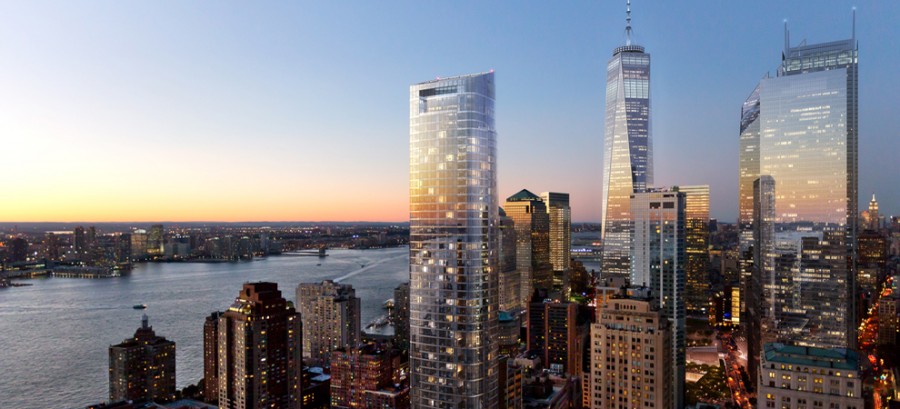By Cathy Hawker Residential News

The skyline downtown. Photo Residential News
This autumn, publishing giant Condé Nast will begin the process of moving all 2,500 of its New York staff from their Midtown offices in Times Square down to One World Trade Center, known as The Freedom Tower, in Lower Manhattan. The move covers a distance of just four miles but its significance is enormous as New Yorkers see the balance of their city shift to the south.
“The biggest change going on in Manhattan right now is Downtown,” says Howard Lorber, the enigmatic Chairman of Douglas Elliman Real Estate. “Going back a few years it would be deserted there after 5pm and at weekends but now it is alive and that means people want to move there. Condé Nast is leading the way and plenty others will follow.”
Lower Manhattan, the area below Canal Street, is changing dramatically. The catalyst for this change was the tax incentives aimed at encouraging businesses and residents back to the Financial District after the devastating World Trade Center attack in 2001. The result has been a decade-long period of new construction, regeneration and huge financial investment.
“The per capita income is strong among the 61,000 residents Downtown,” says Sophia Cicilioni who is selling completed apartments at W Residences Downtown, directly opposite The Freedom Tower. “Battery Park is a family community with parks, playgrounds and river walks and has a growing vibrancy. This is no longer just a Financial District because tech, publishing and media companies are also moving in.”
Restaurants are coming too, notably New York’s much loved Italian food market Eataly, rumoured to be heading to The World Trade Center site. The area is also about to open one and a half million square feet of retail concentrated mainly in two large malls. Brookfield Place and Westfield already have a raft of designer names signed up including Hermes, Tom Ford and Ferragamo. Impressive infrastructure improvements include the Calatrava Transport Hub with the city’s largest underground pedestrian network providing integrated links to 12 subway lines and direct trains to New Jersey.
“Downtown is New York’s fastest growing residential neighbourhood,” says Phillip Hegarty of London-based sales company JP Knight & Partners. “Through the first quarter of 2014 Lower Manhattan sales were up 22 per cent year on year and median price and average price per square foot for new developments have increased around 20 per cent since Q4 of 2012. With over 50,000 new employees expected in Lower Manhattan by 2015 demand for condos should only increase.”
Hegarty points to 50 West Street as an example of what is on offer. On completion in 2016 the striking curved glass skyscraper will have 64 storeys with 191 apartments featuring soaring 20-foot ceilings and clean, contemporary interiors by Danish-born designer Thomas Juul-Hansen. There will be four floors of facilities including a 600 square foot gym, a swimming pool and a top floor observatory. Prices start from $1,525,000 with typical monthly service charges and property taxes of $2,900.
The high tech sales office now open provides potential buyers with 180-degree images of the views the building will provide across New York harbour and The Statue of Liberty. The project launched in June this year and 30 per cent of apartments have sold, mostly to New York purchasers.
Despite the gleaming towers of Wall Street, Lower Manhattan has an impressive collection of historic buildings. This is not a traditional residential area but since 1995, 16 million square foot of office space has changed use, many of them buildings over 100 years old.
The Beekman is the latest example. Built in 1883 and an historic landmark since 1998 the ten-floor red brick building was once home to a small army of accountants and lawyers. With turrets and a wrought iron-edged atrium, it is a striking building and was once the highest in New York, predating the neighboring Woolworth Building.
Today the Beekman is being turned into a 287-room Thompson Hotel while a brand new 51-floor, 600-foot tower of residential apartments is under construction behind it. The newly launched 68 one to three-bedroom apartments are priced from $1,200,000 and will benefit from the hotel’s services and facilities.
“In New York City there is no bad neighborhood anymore,” concludes Howard Lorber who has over thirty years real estate experience in New York. “The market here is strong. Just as in Central Park South which has the best views and the highest prices in New York, so too in Downtown, exciting new projects are under construction. It seems that everyone feels that the higher they build the better these days.”

